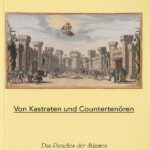
Von Kastraten und Countertenören (Ger.)
2. March 2025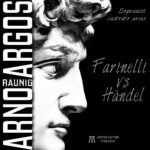
Farinelli vs Händel
2. March 2025
BACK to the PAST
Castrato Arias
€ 20,00
Back To The Past
Album 2016, (with ensemble)
*Concilium Musicum Wien on original instruments*
Arno Raunig, Sopranist
Concilium Musicum Wien:
Christoph Angerer, violin
Astrid Brausperger, violin
Christian Heller, viola
Günter Schagerl, violoncello
Gustavo D’Ippolito, double bass
Matthias Krampe, harpsichord and pianoforte
Castrato Arias: A. Stradella, J.J. Fux, Handel, Gluck, Hasse, Mozart, Pleyel, Rossini.
Recording: Studio Cavalli Records (Bamberg, Germany)
New edition: Caffarelli-CD 2016
19 Arien:
- Alessandro Stradella (1642-1682)
“Pietà signore”, Aria di chiesa (Preghiera) - Johann Joseph Fux (1660-1741)
Ouverture C-Dur aus “Concentus musico-instrumentalis” für Streicher und Basso continuo: Grave – Allegro – Grave - Georg Friedrich Händel (1685-1759)
“Frondi tenere“, Rezitativ und - Georg Friedrich Händel (1685-1759)
“Ombra mai fu“, Arie des Xerxes aus „Xerxes“ - Georg Friedrich Händel (1685-1759)
“Lascia ch´io pianga“, Arie der Almirena aus „Rinaldo“ - Georg Friedrich Händel (1685-1759)
”Verdi prati”, Arie des Ruggiero aus “Alcina” - Johann Josef Fux (1660-1741)
Aus der Ouverture C-Dur: Aire - Christoph Willibald Gluck (1714-1787)
”Che farò senza Euridice”, Arie des Orfeo aus “ Orfeo ed Euridice” - Johann Joseph Fux (1660-1741)
Aus der Ouverture C-Dur: Menuet - Johann Adolph Hasse (1699-1783)
”Eja stellae”, Arie - Johann Adolph Hasse (1699-1783)
”Torrente cresciuto”, Arie des Medarse aus “Siroe, re di Persia” - Johann Joseph Fux (1660-1741)
Aus der Ouverture C-Dur: Marche des Ecurieus - Wolfgang Amadé Mozart (1756-1791)
”Se l´augellin sen fugge”, Arie des Ramiro aus “La finta giardiniera“ KV 196 - Wolfgang Amadé Mozart (1756-1791)
”Ma qual virtù”, Arie des Cabri aus “La Betulia Liberata” KV 118 - Wolfgang Amadé Mozart (1756-1791)
”Parto: Nel gran cimento”, Arie des Sifare aus “Mitridate, Ré di Ponto” KV 87 - Johann Joseph Fux (1660-1741)
Aus der Ouverture C-Dur: Aire de Volage - Ignaz Joseph Pleyel (1757-1831)
”Se ti consiglia amore”, Arie des Ulisse aus “Ifigenia in Aulis” - Johann Joseph Fux (1660-1741)
Aus der Ouverture C-Dur: L´inegalité - Gioachino Rossini (1792-1868)
”Perché mai”, Arie des Arsace aus “Aureliano in Palmyra”
About CD:
This CD contains a collection of my favorite arias. Accompanied by the Concilium Musicum Wien on period instruments, it contains an interesting mix of the most famous castrato arias.
Handel’s aria of Xerxes “Ombra mai fu”, composed for the star castrato Caffarelli (Gaetano Majorano, 1710-1783); the aria of Ruggiero from Handel’s Alcina, composed for the soprano Cusanino (Giovanni Carestini, 1705-1760); an opera highlight by Gluck: “Che faro senza Euridice” for the probably wildest, sword-wielding daredevil among the castratos, the alto Gaetano Guadagni (1725-1806); or the Mozartian bravura aria of Sifare from the opera Mitridate, written for the soprano Sartorino (Pietro Benedetti). We have selected two arias by Hasse as absolute rarities: “Torrente cresciuto”, the aria of Medarse from Siroe, with which Caffarelli was on stage as a direct competitor to Farinelli (as Siroe), and the aria “Eja stellae”! And last but not least, we must not forget the wonderful aria of Ulisse from Pleyel’s “Ifigenia in Aulis”.
Mozart is particularly dear to my heart and I would like to recommend the aria of the knight Ramiro from “La finta giardiniero”, sung at the premiere in 1775 by the soprano Tommaso Consoli (1753-1810), and the aria of Cabri “Ma qual virtu” from the Azione Sacra “La Betulia liberata”. For the last of the great castrato singers, Giovanni Battista Velluti (1781-1861), Rossini wrote the role of Arsace in the opera “Aurelian in Palmyra”, whose aria “Perché mai” is one of my favourite arias, as well as Stradella’s “Pieta signore” and Handel’s “Lascia ch´io pianga”!
Concilium musicum Vienna
The ensemble was founded in 1982 by P. and Chr. Angerer (leadership: P. and Chr. Angerer, management: Chr. Angerer) with the aim of performing works from the 18th century. As a result, the C. m. W. has constantly expanded its repertoire and now (2008) it includes music from the Baroque period through to dance music from the 19th century. The ensemble, which plays on original instruments from the period before and around 1800 (performance practice), strives to perform rarely played works by the Viennese classics and rediscovers today forgotten composers, often subsumed under the term “minor masters”. The mainly handwritten sheet music used often comes from the archives of monasteries and other libraries. The C. m. W., which performs in a wide variety of formations, gives concerts at home and abroad, and also makes radio and television recordings and numerous sound recordings.
HONORS
Mozart Interpretation Prize Flute Clock for the GA of the church sonatas by W. A. Mozart from the Mozartgemeinde Wien (Mozartgemeinde) and the City of Vienna.
2 reviews for BACK to the PAST
Castrato Arias
You must be logged in to post a review.
Related products
-
“LASST LYRIK LEBEN” (Ger.)
€ 15,00 -
Farinelli Arien
€ 22,00 -
Farinelli vs Händel
€ 15,00




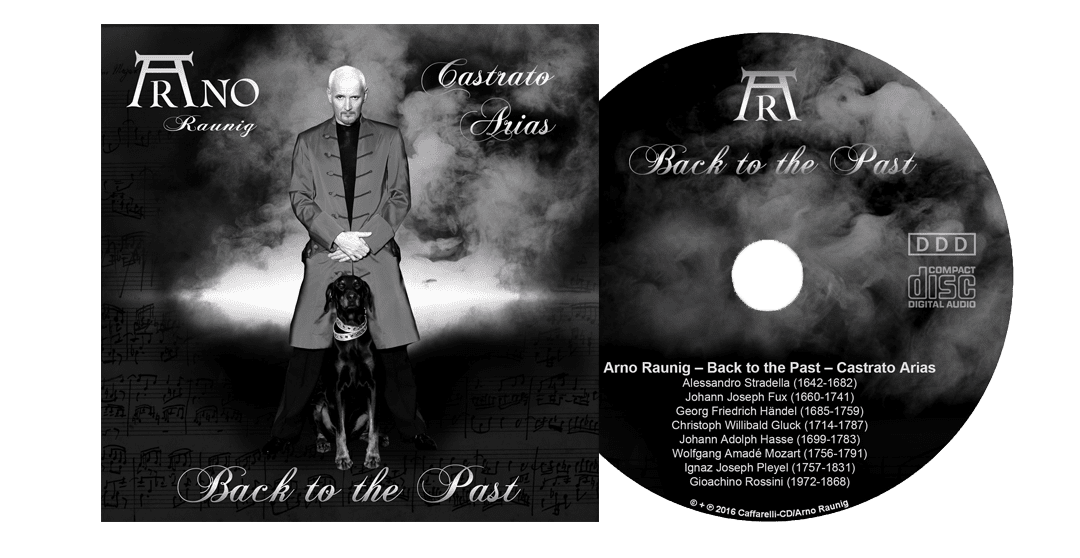
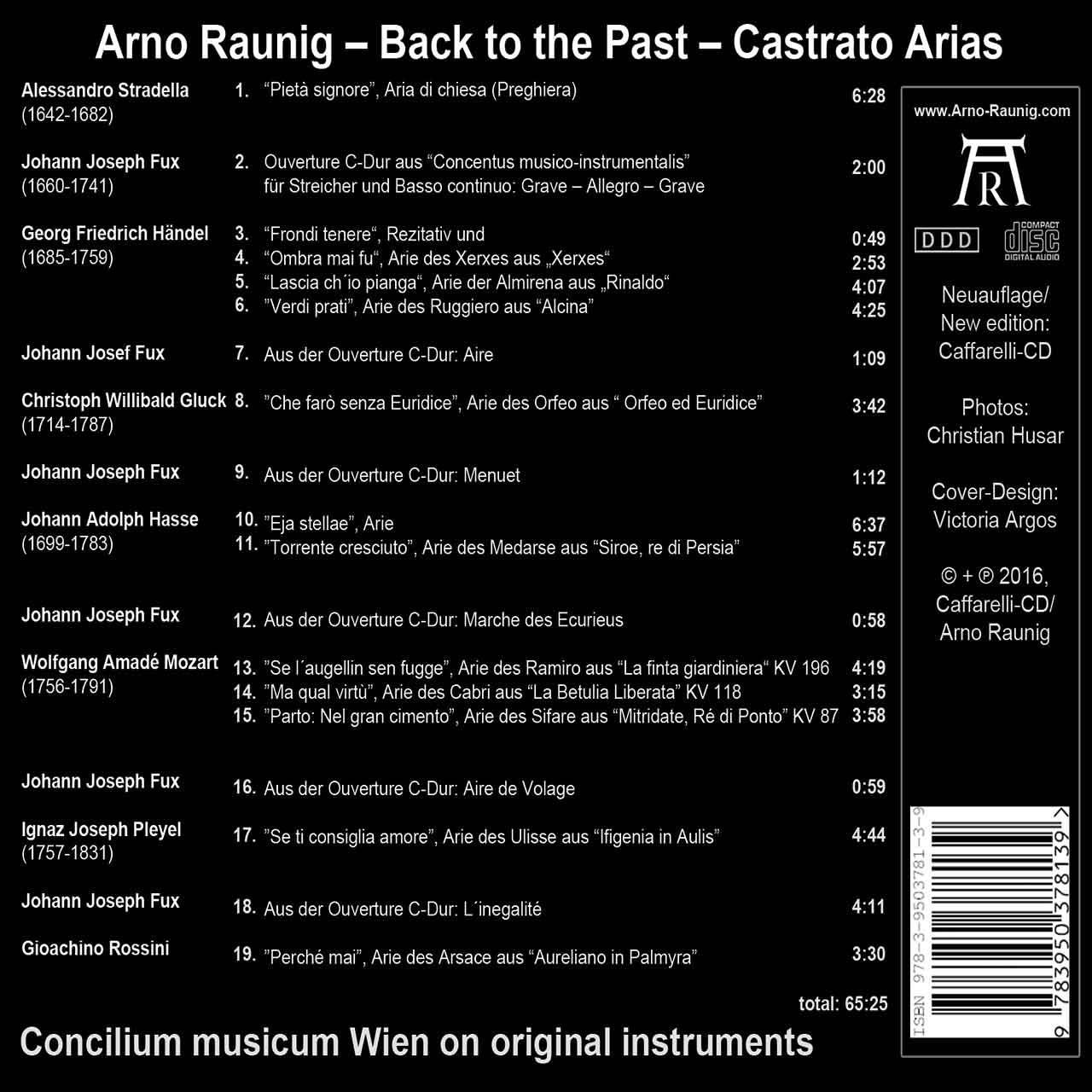
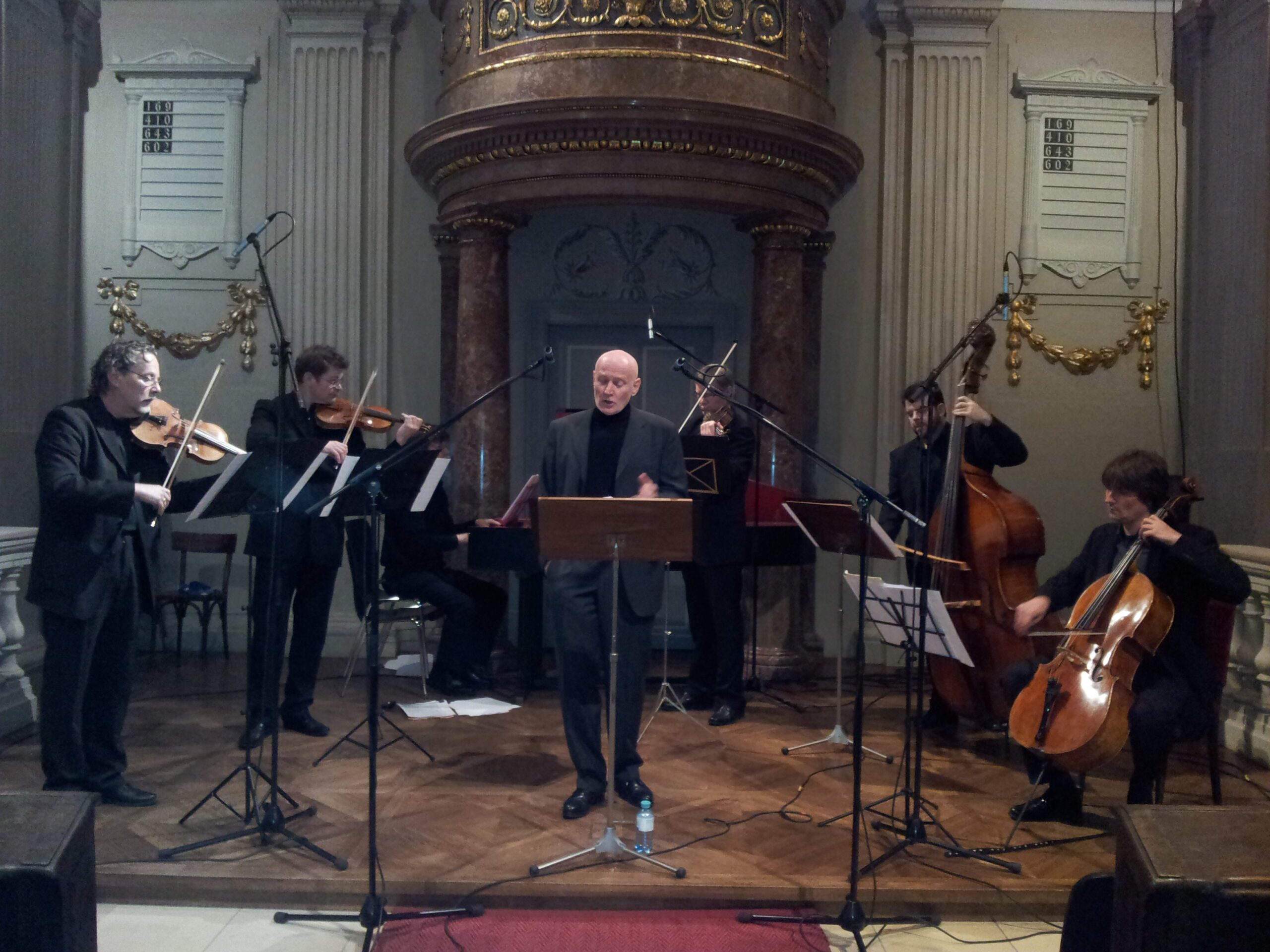







Info –
W.A. Mozart (1756-1791), ”Ma qual virtù”, Arie des Cabri from “La Betulia Liberata” KV 118
Arno Argos Raunig, Sopranist, with orchestra
Album “Back To The Past”
“La Betulia Liberata” – composed in March to July 1771 when Mozart was 15 years old, K. 118 (74c) is a 140-minute “azione sacra” on a text by Metastasio tracing the story of Judith and Holofernes from the biblical Book of Judith.
Info –
”Ma qual virtu”, Arie des Cabri aus “La Betulia Liberata” KV 118
Mozart Wolfgang Amadeus
Arno Argos Raunig, sopranist, countertenor, male-soprano
Maria Hilf Kirche – Weihnachtskonzert